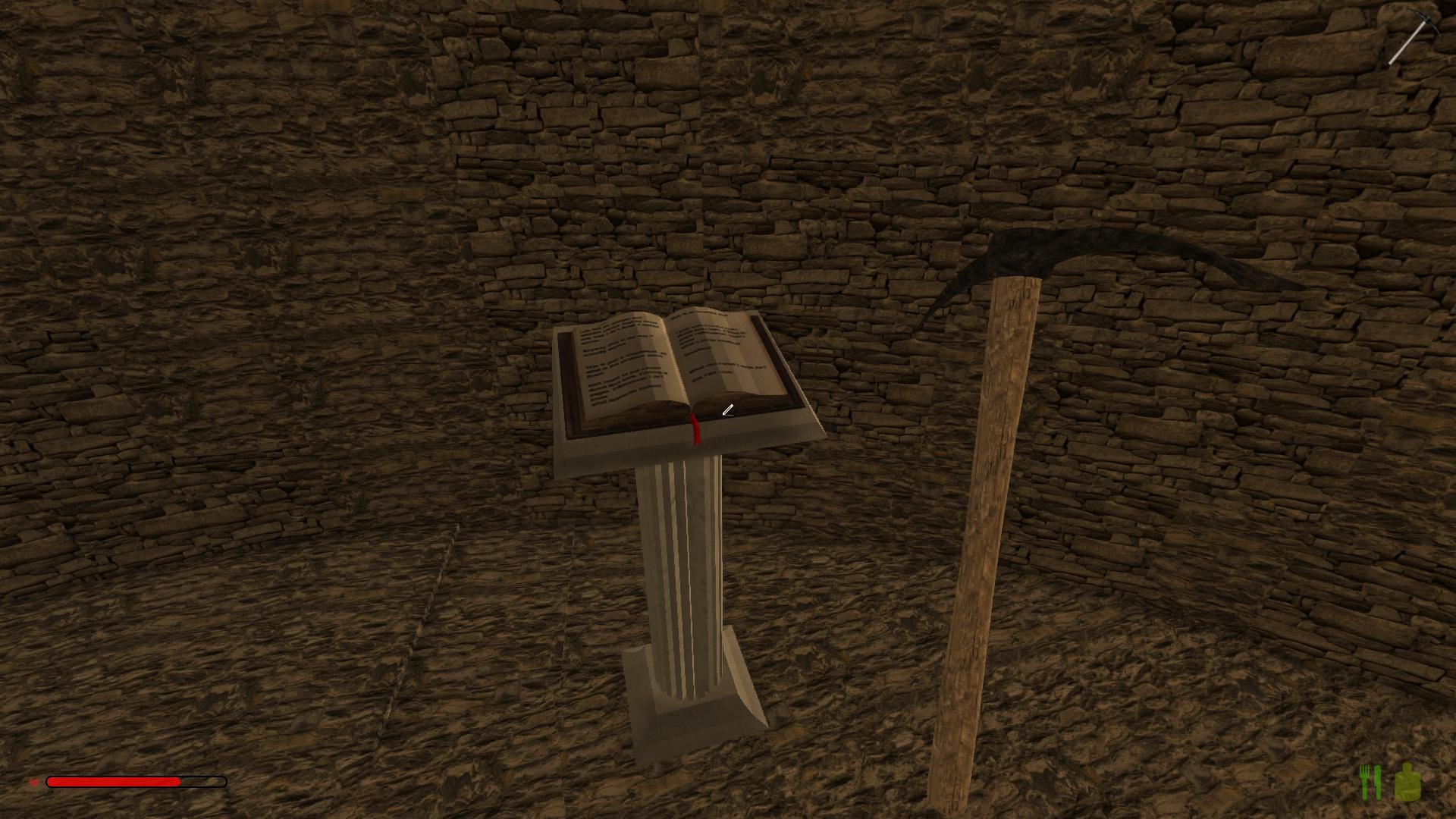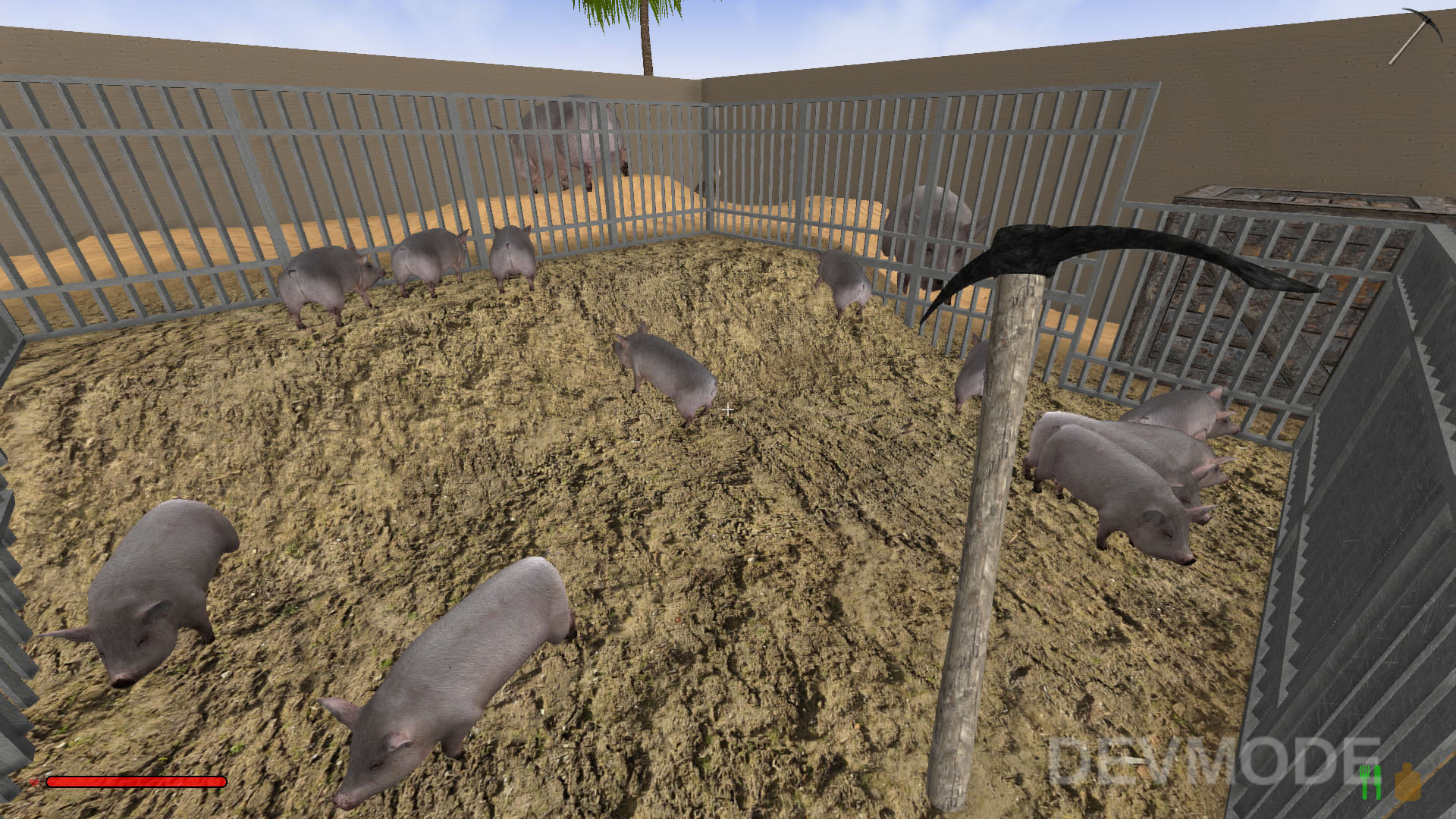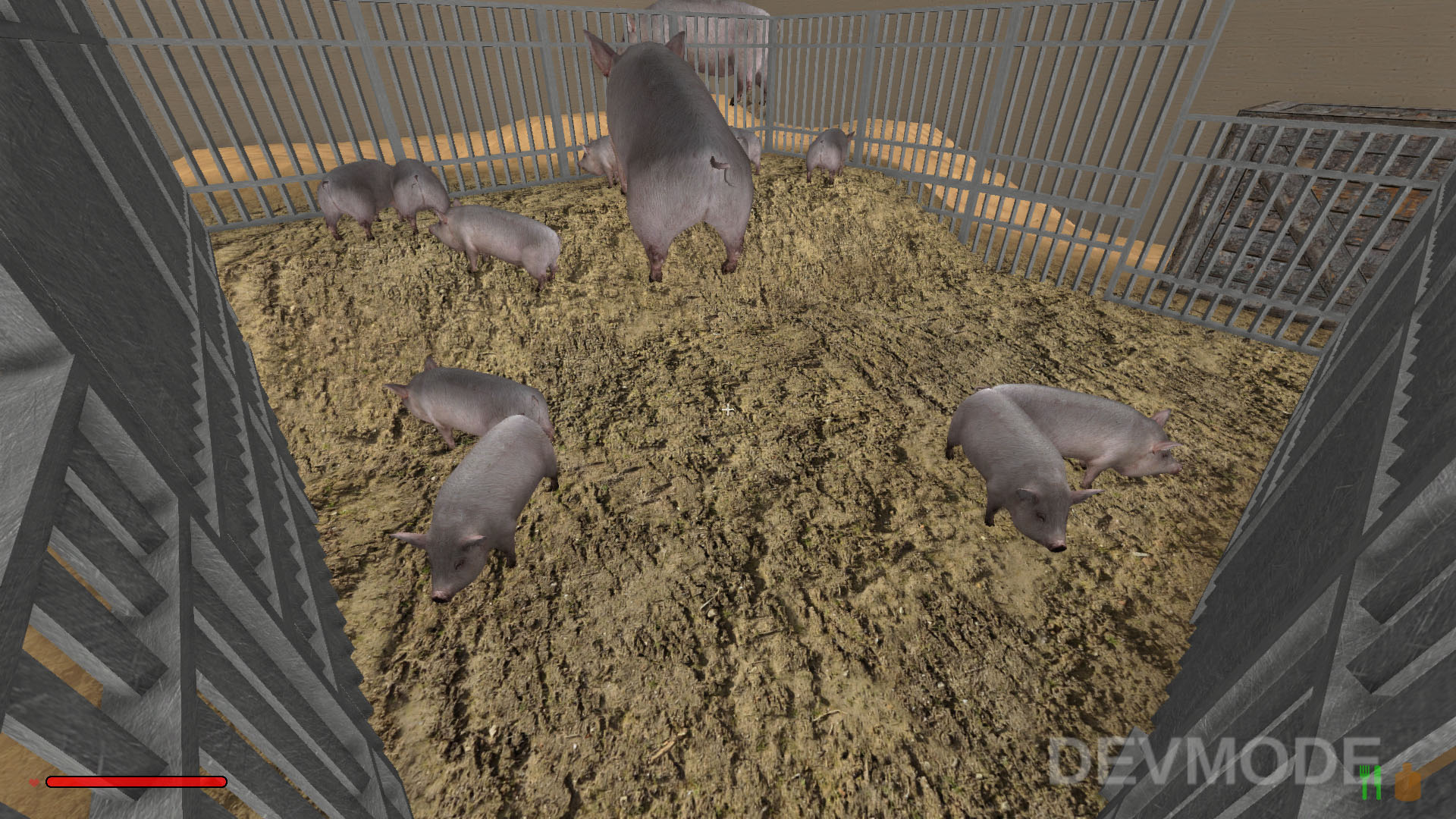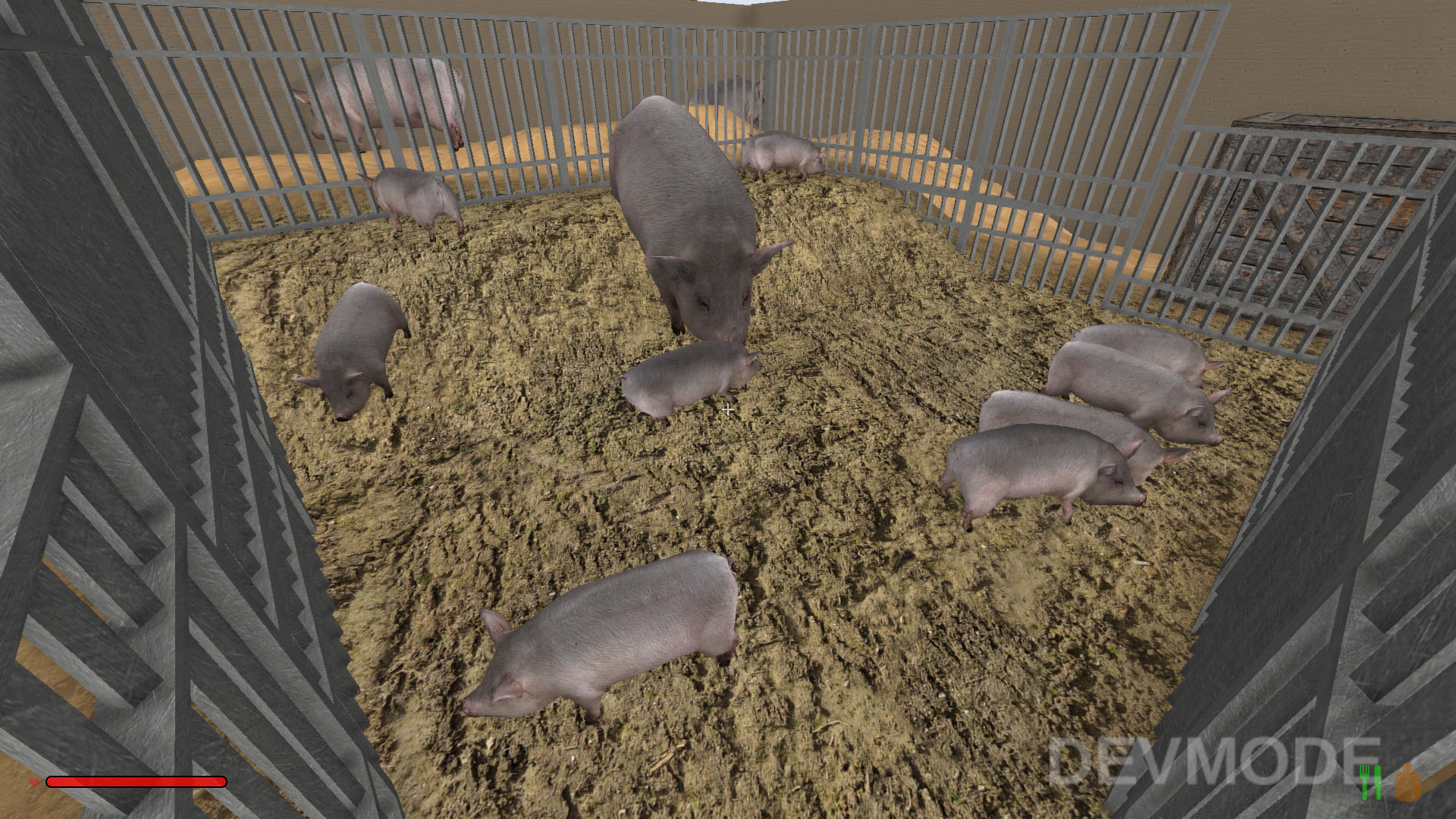Yeah, unfortunately you don't receive updates immediately in Steam (unless you restart it), sometimes it takes a while. But glad to hear it worked ![]()
Posts by red51
A small new update is available now!
-
-
Is the "resources" folder in the jar? The explanation in the pinned topic was a little bit unclear about that: You have to put the "resources" folder into the "src" folder, so when you compile the project, it will be packed into the jar automatically (alternatively you can of course just open the jar file with a zip program [like WinRaR] and put the resources folder there manually).
-
Vielen Dank für das Feedback
 Es ist auf jeden Fall immer gut, wenn die Server nach einem Update nicht sofort in Rauch aufgehen. Wenn die Bugfixes und Performanceänderungen dann auch noch Früchte tragen, ist das umso besser!
Es ist auf jeden Fall immer gut, wenn die Server nach einem Update nicht sofort in Rauch aufgehen. Wenn die Bugfixes und Performanceänderungen dann auch noch Früchte tragen, ist das umso besser!aber die minischweine...................... supertoll und *herzallerliebst* einfach klasse,
Hehe, das freut mich zu hören

für in der beta noch ne leine ums gassi zu führen, und das kommando um nen ball zu holen , und falls das mal iwann möglich ist, eine zähm option das es nachläuft wie ein hund und du hast ne menge glücklicher spieler
Ja, das ist tatsächlich wahr, sowas wäre schon nicht schlecht. Also generell Haustiere halten zu können. Mal sehen, wann wir an diesem Punkt angelangt sind

dir zu ehren nenn ich das erste minischweinchen in meinem gehege auch 51

-
There have been two small updates a few hours ago which should fix the wool and banister issues
 If you're using the Steam version, you may have to restart Steam in order to get the updates.
If you're using the Steam version, you may have to restart Steam in order to get the updates.
About the disappearing tree trunks, that's strange, we will check it out! -
Difficulty: Intermediate
This plugin creates a World3DModel in the world (or multiple 3D models). The player can interact with these models (i.e. he can press his interaction key [F] while looking at them), then a GUI shows up. This GUI consists of a background image (an open book, like the journal), and several labels. It lists all players who have played on this world before, this data can be received from the world database (see: plugin.getWorldDatabase()).There are also two buttons to change the page. These are just two labels which are clickable (see: guiElement.setClickable(boolean)). Once they're clicked, the texts of the labels will be changed, so it gives the impression of changing the page (in addition, a sound file is played [see: player:playGameSound()]).
Once the player presses his ESC key (see: player.registerKeys() and player.setListenForInput()), the guestbook will close (i.e. the visibility will be set to false).
Note: The model and the textures are just very basic in terms of quality.
Additional note: In order to keep the plugin versatile, the coordinates for the particular guestbook models are stored in a "coordinates.txt" file in the plugin main folder. So the coordinates can be changed (and even more instances of the model can be added) easily without the need to recompile the plugin.
-
Difficulty: Very easy
Note: A newer version of this plugin is available!
This is basically a very simple plugin: Once a player types "/ts" into chat, he will be connected to a TeamSpeak server (you have to set the ip and port in the plugin).
-
I have verified the cache and follows same, here I send the log
Thanks for the log, that's actually a strange issue
 The files are up-to-date, at least according to their checksums. This issue only occurs in singleplayer? Do you load a world by double-tapping it, or by pressing the red lan button?
The files are up-to-date, at least according to their checksums. This issue only occurs in singleplayer? Do you load a world by double-tapping it, or by pressing the red lan button?
Is there a "plugins" folder in your game directory? -
East is the error it gives me with the new version in singleplayer, multiplayer works well
Do you run any plugins?
 If not, maybe try to verify integrity of game cache, looks like some gamefiles haven't been updated
If not, maybe try to verify integrity of game cache, looks like some gamefiles haven't been updated 
-
A new update is available
 It mainly focuses on the new plugin API, so it is possible now to run your plugins.
It mainly focuses on the new plugin API, so it is possible now to run your plugins.The plugin API can be considered as a "lite" version of modding, especially since it became quite powerful over the last weeks. Of course it's not exactly the same as creating real mods (e.g. a "total conversion" mod wouldn't be possible this way), but in return, it's much easier to use, and when playing in multiplayer, there is no need to download anything in order to join the server.
But the plugin API not only relevant for multiplayer, but also for singleplayer.Here are a few examples what could be achieved with the new API, just to give you an impression of the potential of the API (especially since it cannot be compared to the old Lua API):
- Elevators (not just basic command/teleport stuff, instead a cabin you can step in, select the target floor, and it will actually move to the desired location)
- Windmills with rotating sails
- A tool rack for your items
- A huge mining drill
- ...
We will upload an example plugin within the next hours. It's basically a guestbook, which gives an overview of all players that have played on your game world in the past (obviously this is mainly interesting for multiplayer server). But as mentioned, it mainly serves as an example plugin. Of course you can still find the Javadoc (which also contains several small examples) here: https://javadoc.rising-world.net/

We are also going to provide a new AreaProtection plugin very soon.
Probably the current Lua API will still be supported for 6-8 weeks until it will be discarded. If you need any help converting your scripts to the new API, or if there are any Lua scripts you urgently need for your server, just let us know. We are not going to leave anyone out in the cold

Apart from that, we also did some changes to the game of course, and fixed some bugs. Among others, we added a "pause" mode (when pressing esc), added a new mini pig (just for fun), fixed some lighting issues (rough light transitions between chunks), reworked and improved many sound effects, and got rid of some crashes. As always, you find the full changelog attached.
We will fully concentrate on the dungeons now. We are really sorry that the dungeons update takes so long. Working on the API was actually quite time consuming, but it was really important for us to get it ready now as soon as possible.
Changelog:
- [New] Full release of the new Plugin API
- [New] Plugin sourcefiles can be compiled "on the fly" and will be loaded directly from your project folder
- [New] Added command "reloadplugins" to reload plugins during runtime (also added permission)
- [New] Game will pause now when pressing ESC (singleplayer only), can be disabled in settings
- [New] Added banister corner element
- [New] Added minipig (currently only spawnable via command "spawnnpc minipig")
- [Change] Returning to main menu should be much faster now
- [Change] Speeded up game startup time
- [Change] Improved animal collision (especially object collision)
- [Change] Reworked and improved many sound effects
- [Change] Blocks which are "half sunken" into the terrain will spawn above the ground now when removed by a sledgehammer
- [Change] Preview when placing stone, dirt etc. can be disabled in config (game_show_terrainfillselector)
- [Change] Sticks and lumber are now also craftable at the sawbench
- [Change] Increased min/max size of glass panes
- [Bugfix] Fixed lighting issues (rough light transitions between chunks)
- [Bugfix] Static lights are now visible in lod chunks again
- [Bugfix] Fixed wrong light colors when placing several lamps in hell
- [Bugfix] Objects (furniture etc) will now be affected by new lights (which have just been placed) correctly
- [Bugfix] Slegehammer can now also be used to deconstruct loam blocks
- [Bugfix] Fixed rare crash when changing resolution
- [Bugfix] Items no longer disappear when dropping them from a chest
- [Bugfix] Fixed red colored screen (when player had low health) when returning
- [Bugfix] Apples can no longer be collected from cut appletrees (same applies to lemon and cherry trees)
_____________________________
Bugfix 2016-10-19:- [Change] Adjusted sound for minipigs
- [Bugfix] Fixed trees not getting removed properly
- [Bugfix] Fixed world only loading very slow when teleporting
- [Bugfix] Fixed missing blueprint preview images
- [Bugfix] Fixed missing text for "GuiLabel" elements
- [Bugfix] Fixed issue which prevented you from shearing sheeps in certain situations
- [Bugfix] Fixed some sound issues
- [Bugfix] Fixed a crash when creating a model without collision (API)
- [Bugfix] JDK path "plugin_jdk_path" in the config file to compile plugins on the fly works properly now
- [Bugfix] Adjusted spawn position of tree logs when removing the stump
- [Bugfix] Fixed issue with plugins not working properly in multiplayer when a player disconnects and reconnects
_____________________________
Bugfix 2016-10-21:- [New] New command "plugins" to show all active plugins (sp only)
- [Bugfix] Fixed some sound effects
- [Bugfix] Fixed missing water slash sound
- [Bugfix] Fixed weird physical behaviour when cutting trees
- [Bugfix] Fixed missing custom models after reloading a world
_____________________________
Bugfix 2016-10-22:- [Bugfix] Fixed crash in certain situation when uploading an image for the poster tool
- [Bugfix] Fixed an issue with api labels (wrong position/color after changing properties)
-
Ein neues Update ist verfügbar! Es konzentriert sich diesmal auf die neue Plugin API, es ist nun möglich, Plugins auszuführen.
Die Plugin API kann quasi als "Lite" Version des Moddings betrachtet werden, vor allem da sie durchaus mächtig wurde in den letzten Wochen. Natürlich ist es nicht genau dasselbe, als würde man richtige Mods erstellen (zB ist sowas wie eine "Total Conversion" Mod nicht möglich), aber im Gegenzug ist die API deutlich einfacher zu benutzen, und wenn man im Multiplayer spielt, muss man nicht extra irgendwas herunterladen um einem Server beizutreten.
Aber die Plugin API ist natürlich nicht nur für den Multiplayer relevant, sondern auch für den Singleplayer.Hier sind ein paar Beispiele, was man mit der API umsetzen könnte, nur um einen kleinen Eindruck von den Möglichkeiten der API zu vermitteln (zumal man die API nicht mit der alten Lua API vergleichen kann):
- Aufzüge (keine Commands/Teleportieren Dinge, sondern eine richtige Kabine, in die man hineintreten kann, das gewünschte Stockwerk wählt, und der Aufzug sich in diese Richtung bewegt)
- Sich bewegende Windmühlen
- Ein Werkzeugständer für Items
- Ein riesiger Minenbohrer
- ...
In den nächsten Stunden wird ein Beispielplugin hochgeladen. Es handelt sich dabei im Grunde um ein Gästebuch, welches einen Überblick über alle Spieler gibt, die bereits auf der selben Welt gespielt haben (offenkundig ist dies eher für den Multiplayer interessant). Aber wie gesagt, es handelt sich lediglich um ein Beispiel. Natürlich findet sich auch die Javadoc (welche ebenfalls kleinere Beispiele beinhaltet) wie gewohnt hier:
https://javadoc.rising-world.net/
Wir werden zudem sehr bald eine neue Version der AreaProtection anbieten.
Wahrscheinlich wird die aktuellen Lua API weiterhin für 6-8 Wochen unterstüzt, bevor wir sie entfernen werden. Wenn jemand Hilfe bei der Konvertierung der alten Skripte benötigt, oder wenn es generell Skripte gibt, welche für den Serverbetrieb unabdingbar sind, lasst es uns einfach wissen. Wir werden niemanden damit einfach im Regen stehen lassen

Abgesehen davon haben wir auch einige Änderungen am Spiel vorgenommen, und auch ein paar Bugs behoben. Unter anderem gibt es nun einen "Pause" Modus (wenn ESC gedrückt wird), wir haben ein Minischweinchen hinzugefügt (nur zum Spaß @famyko
 ), einige Lichtprobleme behoben (vor allem harte Lichtkanten an Chunkübergängen), viele Soundeffekte überarbeitet und verbessert, und sind ebenso ein paar Crashes losgeworden. Wie immer findet sich anbei der vollständige Changelog.
), einige Lichtprobleme behoben (vor allem harte Lichtkanten an Chunkübergängen), viele Soundeffekte überarbeitet und verbessert, und sind ebenso ein paar Crashes losgeworden. Wie immer findet sich anbei der vollständige Changelog.Wir werden uns nun vollends auf die Dungeons konzentieren. Es tut uns wirklich Leid, dass diese so lange auf sich warten lassen. Die Arbeit an der API war recht Zeitaufwändig, aber es war uns sehr wichtig, diese zu schnell wie möglich einsatzbereit zu bekommen.
Changelog:
- [Neu] Vollständiger Release der neuen Plugin API
- [Neu] Plugin Sourcedateien können automatisch kompiliert und direkt aus dem Projektordner geladen werden
- [Neu] Command "reloadplugins" hinzugefügt um Plugins während Laufzeit neuzuladen (inkl. Permission)
- [Neu] Das Spiel pausiert nun wenn ESC gedrückt wird (nur Singleplayer), kann in Einstellungen deaktiviert werden
- [Neu] Eckelement für Geländer hinzugefügt
- [Neu] Minischweinchen hinzugefügt (momentan nur spawnbar per Befehl "spawnnpc minipig")
- [Änderung] Das Zurückkehren ins Hauptmenü sollte nun deutlich schneller vonstatten gehen
- [Änderung] Spielstart beschleunigt
- [Änderung] Tierkollision verbessert (besonders Objektkollision)
- [Änderung] Viele Soundeffekte verbessert und überarbeitet
- [Änderung] Blöcke, die zur Hälfte im Boden stecken, spawnen nun oberhalb des Boden wenn sie mit dem Vorschlaghammer entfernt werden
- [Änderung] Vorschau beim Platzieren von Stein, Erde etc. kann in config ausgeschaltet werden (game_show_terrainfillselector)
- [Änderung] Stöcke und Holz können nun auch an der Sägebank hergestellt werden
- [Änderung] Mindest-/Maximalgröße von Glassscheiben erhöht
- [Behoben] Beleuchtungsprobleme behoben (harte Kanten an Chunkübergängen)
- [Behoben] Statische Lichter sind nun wieder in LOD Chunks sichtbar
- [Behoben] Fehlerhafte Lichtfarben behoben wenn mehrere Lampen in Hölle platziert wurden
- [Behoben] Objekte (Möbel etc) werden nun von neu platzierten Lichtquellen korrekt beleuchtet
- [Behoben] Seltenen Crash beim Ändern der Auflösung behoben
- [Behoben] Items verschwinden nicht mehr wenn man sie aus einer Kiste wirft
- [Behoben] Vorschlaghammer kann nun auch Lehmblöcke abbauen
- [Behoben] Rot-gefärbten Bildschirm (wenn Spieler wenig Health hatte) beim Zurückkehren ins Hauptmenü behoben
- [Behoben] Äpfel können nicht länger von gefällten Apfelbäumen gesammelt werden (selbiges gilt für Zitronen- und Kirschbäume)
_____________________________
Bugfix 19.10.2016:- [Geändert] Sound für Minischweinchen angepasst
- [Behoben] Behoben, dass Bäume nicht richtig entfernt wurden
- [Behoben] Behoben, dass sich die Welt nach dem Teleportieren nur sehr langsam aufbaut
- [Behoben] Fehlende Blaupausen Vorschaubilder korrigiert
- [Behoben] Fehlende Texte bei "GuiLabel" Elementen behoben
- [Behoben] Problem behoben, dass Schafe manchmal nicht geschoren werden konnten
- [Behoben] Einige Soundprobleme behoben
- [Behoben] Crash behoben, wenn Modelle ohne Kollision über die API erzeugt wurden
- [Behoben] JDK Pfad "plugin_jdk_path" in Config um Plugins während Laufzeit zu kompilieren wird nun korrekt verwendet
- [Behoben] Spawnposition der Baumstammstücke angepasst, wenn der Stumpf entfernt wird
- [Behoben] Probleme mit Plugins im Multiplayer behoben, wenn Spieler disconnected und reconnected ist
_____________________________
Bugfix 21.10.2016:- [Neu] Neuer Command "plugins" um die aktiven Plugins anzuzeigen (nur SP)
- [Behoben] Soundprobleme behoben
- [Behoben] Fehlenden Wasser Splash Sound behoben
- [Behoben] Fehlerhaftes physikalisches Verhalten beim Fällen von Bäumen behoben
- [Behoben] Fehlende Plugin Modelle nach dem Neuladen einer Karte behoben
_____________________________
Bugfix 22.10.2016:- [Behoben] Crash in bestimmten Situationen behoben, wenn Bilder für Poster hochgeladen wurden
- [Behoben] Fehler mit api labels behoben (falsche Position/Farbe nachdem Eigenschaften geändert wurden)
-
Also die Verwendung eines VPN Dienstes ist eigentlich relativ einfach, zumindestens o.g. Programm lässt sich recht einfach bedienen
 Leider ist das tatsächlich momentan die einzige Lösung...
Leider ist das tatsächlich momentan die einzige Lösung...Wir wissen leider nicht genau, welche Umstände zu diesem Phänomen führen (im Vergleich zu den meisten anderen Spielen transferiert RW verhältnismäßig viele Daten zwischen Client und Server, das ist im Grunde das einzige, was sich offenkundig unterscheidet).
Es sind auch tatsächlich bei weitem nicht alle Kabelnutzer davon betroffen, aber bislang beschränkt sich das Problem ausnahmslos auf Kabelnutzer (und in erster Linie auf deutsche und österreichische Nutzer - es gab zwar auch schonmal solch einen Fall bei einem US Nutzer, aber das war wohl wirklich eher eine Ausnahme).Mittelfristig hilft nur, einen automatischen Reconnect zu implementieren (die Verbindungsverluste werden zwar weiterhin auftreten, dein Client würde sich aber erneut zum Server verbinden, sodass du davon nichts merken solltest). Generell haben wir umfangreichere Änderungen am Netzwerkcode geplant (um u.a. auch Support für Steams p2p Networking [Freunde direkt ins Spiel einladen ohne Portfreigaben etc] anzubieten), leider kann ich noch nicht abschätzen, wann genau das geschehen wird

-
Minischweine... du meinst sowas?




-
Long topic... where to start?
 In general: As mentioned, all rotations are basically intrinsic rotations, but they don't work exactly as you may expect. Basically a construction element keeps all information it needs to reconstruct the rotation from an empty quaternion. When rotating a construction element (while placing it), you basically just increment (or decrement) the particular rotation values (rotation around x, y and z axis).
In general: As mentioned, all rotations are basically intrinsic rotations, but they don't work exactly as you may expect. Basically a construction element keeps all information it needs to reconstruct the rotation from an empty quaternion. When rotating a construction element (while placing it), you basically just increment (or decrement) the particular rotation values (rotation around x, y and z axis).
When converting these euler angles to a quaternion, the rotation values will be applied in the order y, z, x, i.e. yaw, roll, pitch, or in other words, heading, attitude and bank (when thinking of an airplane).
However, since we're going to rework the construction system in the future anyway, we will check out if there is a more convenient way for the rotations
From your screen shot it is not easy to appreciate angles, so I may be wrong, but the rotation around the beam Y axis does not look as it be precisely 45°.
Getting fully accurate angels is not that easy. There is always a loss in precision when it comes to the conversion of euler angles to quaternions, this is unavoidable. Especially since the game just uses floats, which have a limited precision (but even when using double values, there is always a precision loss when converting euler angles to quaternions). But usually the precision is sufficient, as long as we don't want to create some CAD software

Precision is not optional: if you don't need it and it is there, it does no harm
It depends, at least when we're talking about precision in general. For example, the translation of every element has a limited precision (since we want to keep the amount of data the game has to store per element as low as possible). When it comes to the rotation, there is still some room for a higher precision (i.e. 0.5 degree steps), we just thought it wouldn't be necessary at all (that's why at least the stetr command does not accept values lower than 1).
Now, jMonkey (the framework RW is developed upon) comes with built-in support for them and I cannot think of a reason strong enough for NOT using it, as RW apparently does now.
Basically the JME implementation of euler-to-quaternion conversion is based on this: http://www.euclideanspace.com/…lerToQuaternion/index.htm
Nevertheless, RW mainly uses JME for rendering and scene management (and JME does an awesome job when it comes to these things). But everything that goes a little bit more into detail requires specific solutions (best example: water. Actually the RW water has absolutely nothing in common with the JME water, although JME offers great looking water "out-of-the-box", but that implementation isn't compatible with dynamic worlds, or more precisely, voxel based worlds).
When it comes to the translation or rotation of objects or constructions, we have to do our own math (basically a construction element isn't just a single object, it's baked into a mesh with all other contructions in the same chunks (same applies to objects, like furniture). When it's necessary to transform a single element (e.g. opening a door), the particular vertices are just rotated around a certain point (since the game doesn't know anything about the door except its offset in the vertex buffer).Challenge
Achieving this is tricky when it's necessary to have a precise rotation. Getting appropriate screenshots is even more difficult, since it highly depends on the camera view (having a parallel projection would be more helpful in this case^^). However, here is a beam which should meet these requirements. It's necessary to use a rotation precision (setr) of 1 (indeed this is a situation where 0.5 degree steps would be helpful). To get exactly this angle, you have to experiment with the x and z rotation a little bit.
-
Grundsätzlich besagt ein "Connection reset", dass die Verbindung zwischen Client und Server unerwartet getrennt wurde.
Vorweg stellt sich die Frage, ob du Kabelinternet (also kein DSL, sondern Internet bei einen Kabelanbieter) hast, und ob der "Connection reset" nach exakt 10 Minuten auftritt. Wenn sich beides bejahen lässt, dann handelt es sich leider um ein bekanntes Problem, welches manche Leute mit Kabelinternet betrifft. Dann wird die Internetverbindung beabsichtigt getrennt (aber nicht vom Spiel), nämlich von einem der Knotenpunkte; generell durchlaufen alle Pakete, die du zu einem Server sendest, mehrere Knotenpunkte, und irgendeinem dieser Nodes gefällt entweder die Datenmenge nicht, oder was auch immer, sodass dieser mit voller Absicht die Verbindung unterbricht.
In den allermeisten Fällen hilft es, einen VPN Dienst wie bspw. "Cyberghost" zu verwenden. Dann legen deine Pakete i.d.R. ein andere Strecke zurück, und der "problematische" Node wird sehr wahrscheinlich umgangen.
Wir haben auf dieses Problem keinen direkten Einfluss, zumal wir die genaue Ursache nicht kennen. Es hängt stark von deinem Vertrag sowie deinem Wohnort ab (aber auch das ist kaum eine verlässliche Größe, selbst dein Nachbar kann schon nicht mehr von dem Problem betroffen sein). Einzige Lösung für dieses Problem von unserer Seite wäre die Implementierung eines automatischen Reconnect, sobald die Verbindung verloren geht (das ist auch geplant, wird aber leider noch etwas dauern).
Falls du kein Kabelinternet hast, dann wird diese Problem eher durch Antivirenprogramme oder eine Firewall etc. verursacht.
-
That's strange
 We will check out what's going on there!
We will check out what's going on there! -
Who is asking for a backup file exactly?
Losing the savegame is of course not supposed to happen oO Unless you press the "delete" button in the singleplayer menu, there is no way the game deletes a savegame (so this might only be caused by an external influence - file loss, harddrive issues, malware).
The game saves the world all 10 seconds (and also when you leave the game), if an error occurs while saving, you will see a message in chat. What antivirus program do you use exactly? Some programs (like Comodo) run the game in a "sandbox", i.e. the game is not able to write on the harddrive.
You can make sure if there is still the world file in place, just go into the game directory (steamversion: rightclick on rw in steam -> properties -> local files -> browse local files) into the "Worlds" subfolder, there should be a folder with the name of your world. This folder is supposed to contain a ".db" file, as well as another subfolder "worldParts" (which contains more .db files).
Can you still select your world in the singleplayer menu?
-
Hast du die Dateiendungen in Windows einblenden lassen?
-
Also ich hab mir das nochmal angeguckt: Kann es sein, dass du versucht hast, den Bauplan zu entpacken? Denn die Datei "bob_strlat_4_arm_1476102636.blueprint" Datei hat eigentlich nur eine Dateigröße von 457 KB, bei dir hingegen hat sie knapp über 1 MB (daneben befindet sich bei dir eine identische Datei, die als WinRaR Archiv erkannt wird und die richtige Dateigröße hat). Man kann zwar .blueprint Dateien mit WinRaR öffnen, beim Entpacken kommt aber eine unbrauchbare Datei raus.
Zunächst würde ich dir empfehlen, Dateiendungen in Windows einzublenden. Das reduziert das Auftreten solcher Missverständnisse, denn offenbar hat die WinRaR Datei eine andere Dateiendung, die jedoch ausgeblendet wird.
Als nächstes lösche am besten den kompletten Inhalt des Blueprints Ordners (nicht den Blueprint Ordner selbst, sondern nur die Dateien, die sich darin befinden), lade dann die Bauplan-Dateien erneut aus dem Forum herunter, und speichere sie in dem Ordner. Die Dateien
müssendürfen nicht entpackt werden, d.h. so wie du sie herunterlädst, einfach in den Ordner verschieben (das Spiel muss neugestartet werden, damit die Dateien erkannt werden).Um übrigens einen Bauplan zu benutzen, musst du ein Bauplan-Item in Händen halten, dann das Journal aufrufen, den Bauplan auswählen und unten rechts "Bauplan benutzen" anwählen.
-
Welches WorldEdit hast du genau heruntergeladen, bzw. wo hast du es heruntergeladen? Offenbar kursieren hier ein paar fehlerhafte Versionen, die aufgrund fehlender Daten nicht lauffähig sind

Bei den Befehlen ist es wichtig, diese immer mit einem vorangehenden "/" zu schreiben. Alle Befehle müssen in den Chat eingegeben werden (also nicht in die Konsole oder so). -
@Baumeister123: Du hast auf dem Bild die Kategorie "1" ausgewählt (damit wird nur der Inhalt des Unterordners mit dem Namen "1" angezeigt, welcher sich ja in deinem "Blueprints" Ordner befindet). Klicke mal auf einen der kleinen Pfeile links (<) und rechts (>) neben der 1, damit kann die Kategorie gewechselt werden. Sobald du in der Hauptkategorie angelangt bist, müsste der Bauplan angezeigt werden


